UK Calendar 2025-2026: An Overview Of Public And Bank Holidays
UK Calendar 2025-2026: An Overview of Public and Bank Holidays
Related Articles: UK Calendar 2025-2026: An Overview of Public and Bank Holidays
- The 2025 Doe Calendar: 24 Nature-Inspired Experiences In New York City
- NSW School Holidays 2025 Calendar Australia
- RSU 10 School Calendar 2025: A Comprehensive Overview
- OPM Calendar 2025 PDF: A Comprehensive Guide To Major Observances And Holidays
- Editable Calendar 2025 Excel: A Comprehensive Guide
Introduction
With enthusiasm, let’s navigate through the intriguing topic related to UK Calendar 2025-2026: An Overview of Public and Bank Holidays. Let’s weave interesting information and offer fresh perspectives to the readers.
Table of Content
Video about UK Calendar 2025-2026: An Overview of Public and Bank Holidays
UK Calendar 2025-2026: An Overview of Public and Bank Holidays

The United Kingdom observes a range of public and bank holidays throughout the year, providing opportunities for rest, relaxation, and celebration. The 2025-2026 calendar features a diverse array of holidays, including traditional festivals, religious observances, and commemorative events. This comprehensive overview will provide a detailed guide to the UK calendar for 2025 and 2026, ensuring that you can plan your year ahead and make the most of these special occasions.
2025 Calendar
January
- New Year’s Day (1st January): A national holiday marking the start of the new year.
- Epiphany (6th January): A Christian feast day commemorating the visit of the Magi to the infant Jesus. (Observed in Scotland only)
February
- Saint Valentine’s Day (14th February): A day dedicated to love and romance.
- Shrove Tuesday (17th February): The day before Ash Wednesday, traditionally celebrated with pancakes.
- Ash Wednesday (18th February): The first day of Lent, a period of fasting and reflection in the Christian calendar.
March
- Saint David’s Day (1st March): A national holiday in Wales, celebrating the patron saint of the country.
- Mothering Sunday (23rd March): A day to honor and celebrate mothers.
April
- Good Friday (10th April): A Christian holiday commemorating the crucifixion of Jesus.
- Easter Monday (13th April): A national holiday following Easter Sunday, celebrating the resurrection of Jesus.
May
- Early May Bank Holiday (5th May): A national holiday marking the start of the May bank holiday weekend.
- VE Day (8th May): A day commemorating the end of World War II in Europe.
- Ascension Day (15th May): A Christian feast day commemorating the ascension of Jesus into heaven.
- Spring Bank Holiday (25th May): A national holiday marking the end of the May bank holiday weekend.
June
- Trooping the Colour (14th June): A military parade celebrating the official birthday of the British monarch.
- Father’s Day (15th June): A day to honor and celebrate fathers.
July
- Midsummer’s Day (21st June): The longest day of the year, traditionally celebrated with bonfires and festivals.
August
- Summer Bank Holiday (4th August): A national holiday marking the start of the August bank holiday weekend.
- Carnival (25th August): A day of celebration and festivities, popular in Notting Hill, London.
September
- Labour Day (1st September): A day to celebrate the contributions of workers. (Observed in Scotland only)
- Harvest Festival (28th September): A celebration of the autumn harvest, often held in churches.
October
- Saint Andrew’s Day (30th October): A national holiday in Scotland, celebrating the patron saint of the country.
November
- Remembrance Day (11th November): A day to remember those who have fallen in war.
- Saint Andrew’s Day (30th November): A national holiday in Scotland, celebrating the patron saint of the country.
December
- Christmas Day (25th December): A national holiday celebrating the birth of Jesus.
- Boxing Day (26th December): A traditional holiday following Christmas Day, often spent with family and friends.
2026 Calendar
January
- New Year’s Day (1st January): A national holiday marking the start of the new year.
- Epiphany (6th January): A Christian feast day commemorating the visit of the Magi to the infant Jesus. (Observed in Scotland only)
February
- Saint Valentine’s Day (14th February): A day dedicated to love and romance.
- Shrove Tuesday (9th February): The day before Ash Wednesday, traditionally celebrated with pancakes.
- Ash Wednesday (10th February): The first day of Lent, a period of fasting and reflection in the Christian calendar.
March
- Saint David’s Day (1st March): A national holiday in Wales, celebrating the patron saint of the country.
- Mothering Sunday (15th March): A day to honor and celebrate mothers.
April
- Good Friday (3rd April): A Christian holiday commemorating the crucifixion of Jesus.
- Easter Monday (6th April): A national holiday following Easter Sunday, celebrating the resurrection of Jesus.
May
- Early May Bank Holiday (4th May): A national holiday marking the start of the May bank holiday weekend.
- VE Day (8th May): A day commemorating the end of World War II in Europe.
- Ascension Day (14th May): A Christian feast day commemorating the ascension of Jesus into heaven.
- Spring Bank Holiday (25th May): A national holiday marking the end of the May bank holiday weekend.
June
- Trooping the Colour (13th June): A military parade celebrating the official birthday of the British monarch.
- Father’s Day (15th June): A day to honor and celebrate fathers.
July
- Midsummer’s Day (21st June): The longest day of the year, traditionally celebrated with bonfires and festivals.
August
- Summer Bank Holiday (3rd August): A national holiday marking the start of the August bank holiday weekend.
- Carnival (24th August): A day of celebration and festivities, popular in Notting Hill, London.
September
- Labour Day (1st September): A day to celebrate the contributions of workers. (Observed in Scotland only)
- Harvest Festival (27th September): A celebration of the autumn harvest, often held in churches.
October
- Saint Andrew’s Day (30th October): A national holiday in Scotland, celebrating the patron saint of the country.
November
- Remembrance Day (11th November): A day to remember those who have fallen in war.
- Saint Andrew’s Day (30th November): A national holiday in Scotland, celebrating the patron saint of the country.
December
- Christmas Day (25th December): A national holiday celebrating the birth of Jesus.
- Boxing Day (26th December): A traditional holiday following Christmas Day, often spent with family and friends.
Additional Notes:
- Bank holidays are typically observed on a Monday in the UK, unless they fall on a weekend.
- Some holidays may be observed differently in different parts of the UK, such as Saint Patrick’s Day in Northern Ireland.
- The UK government may declare additional bank holidays on special occasions, such as royal weddings or jubilees.
- It is recommended to check official sources for the most up-to-date information on public and bank holidays in the UK.
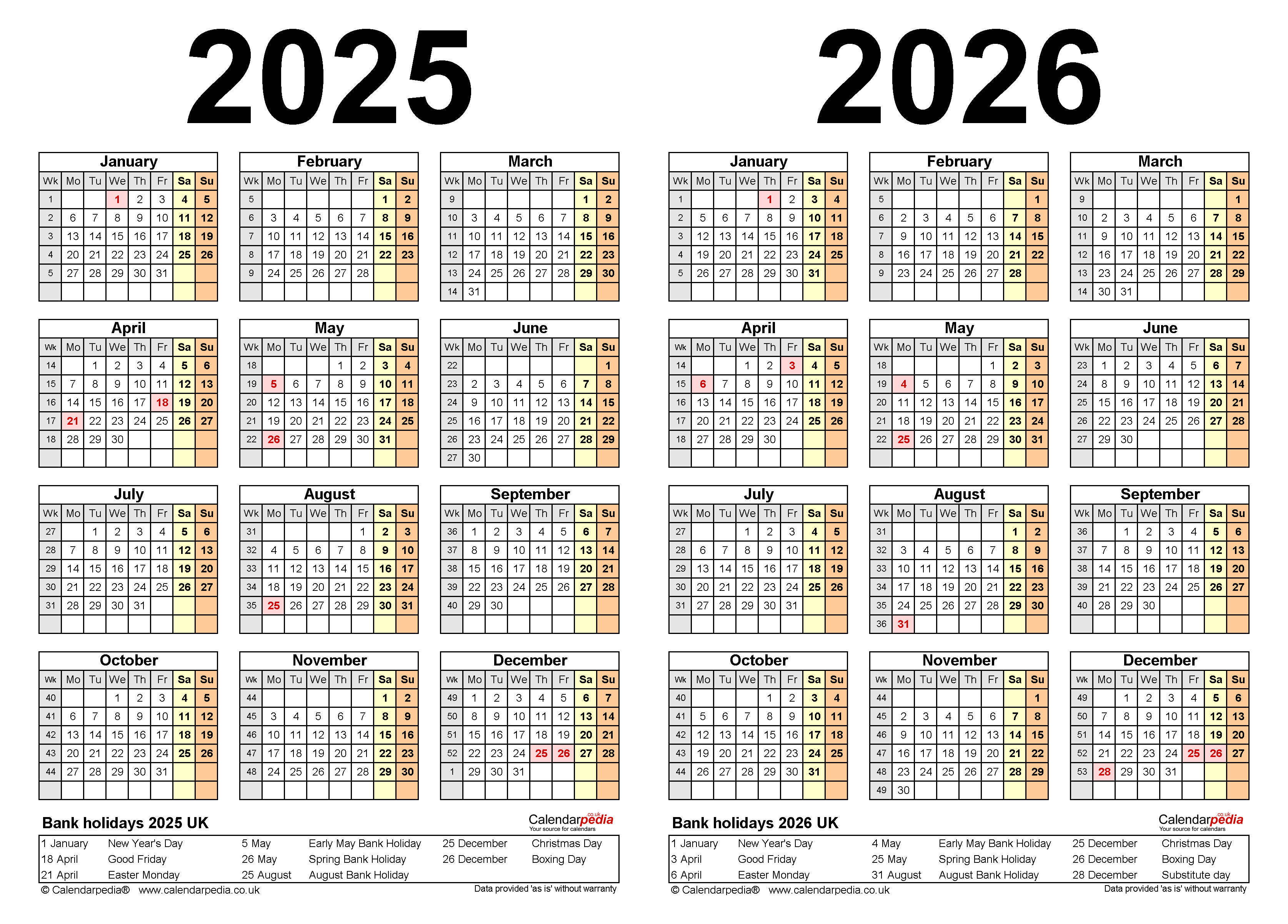
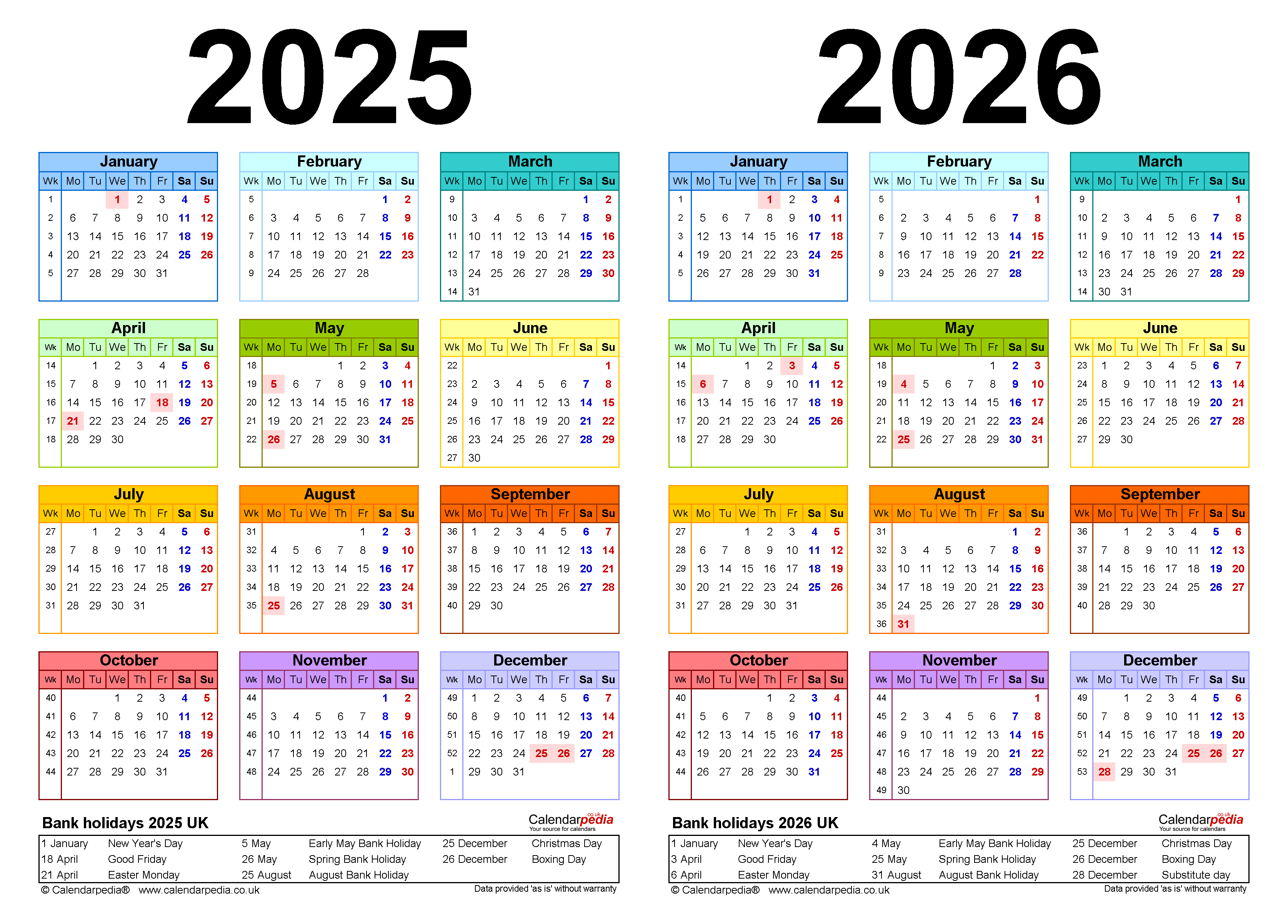
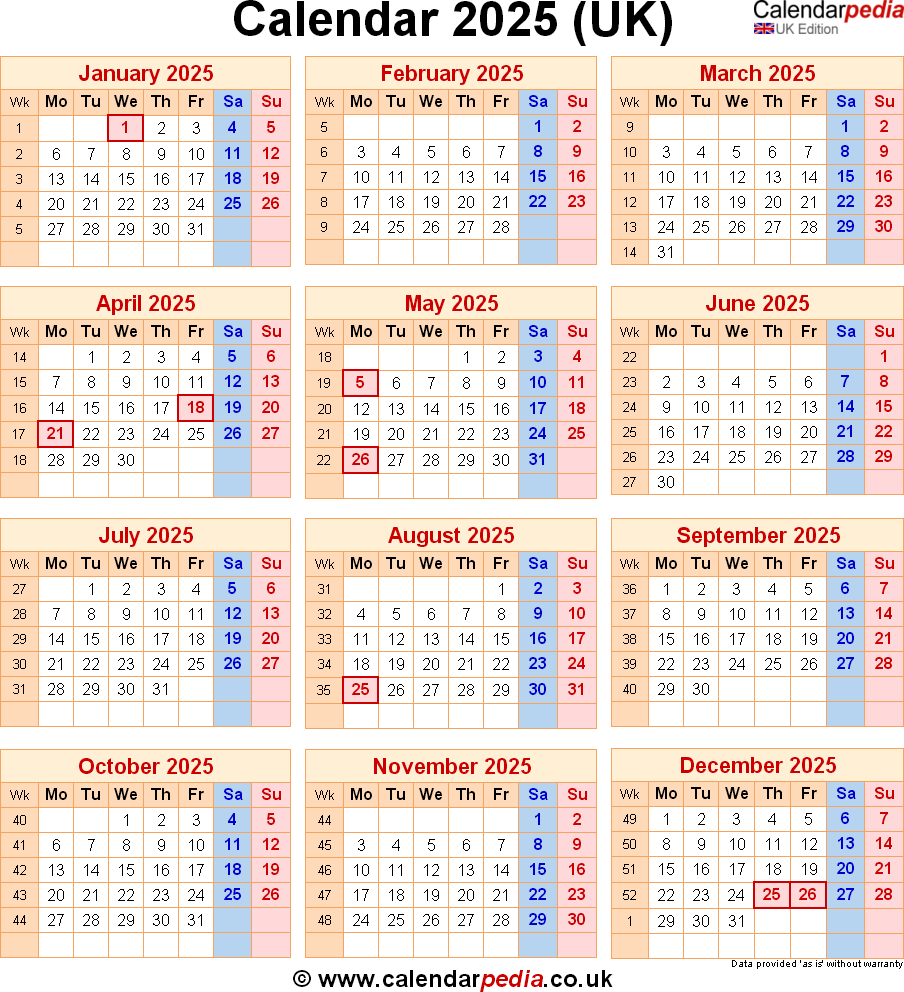

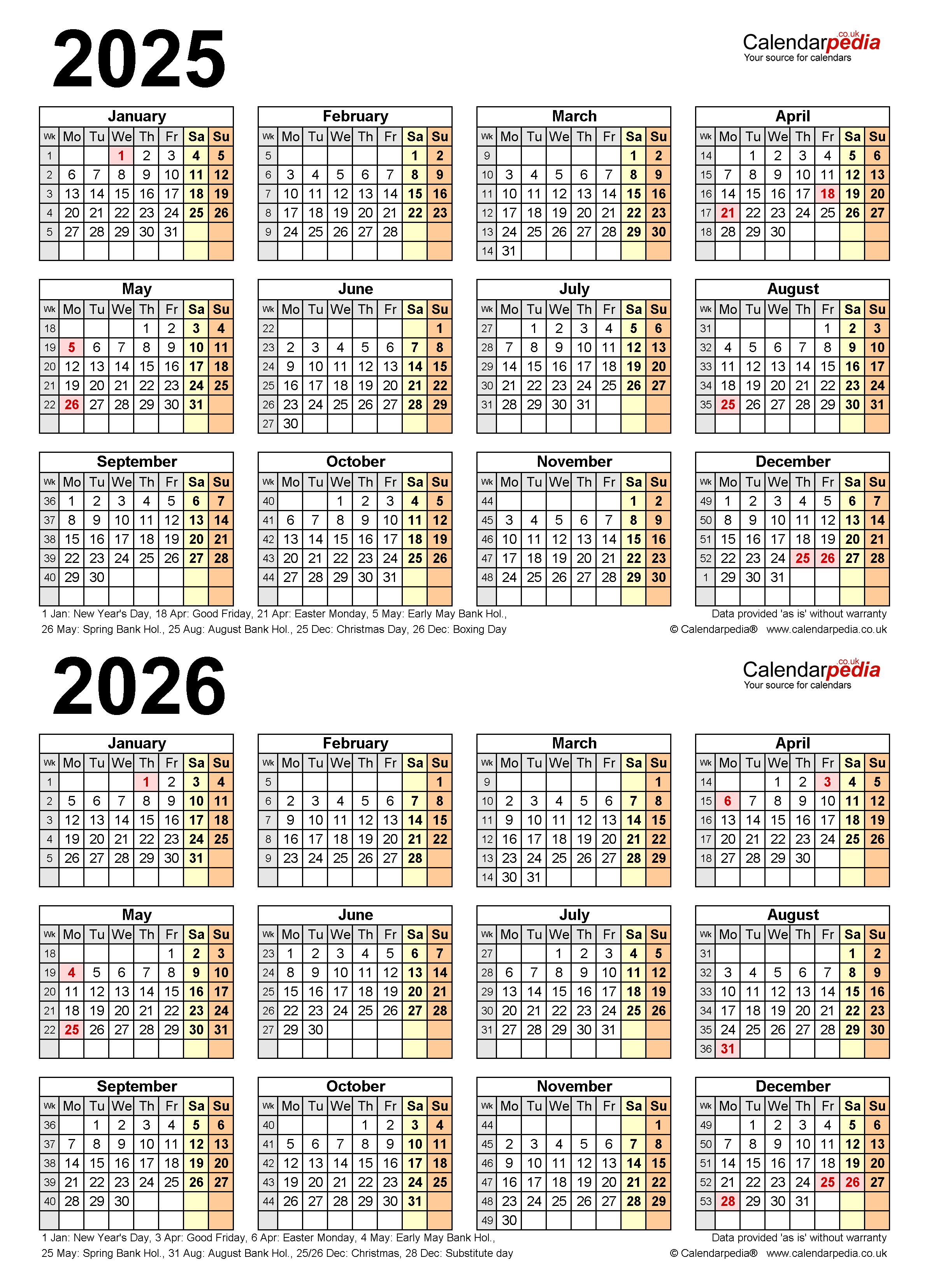


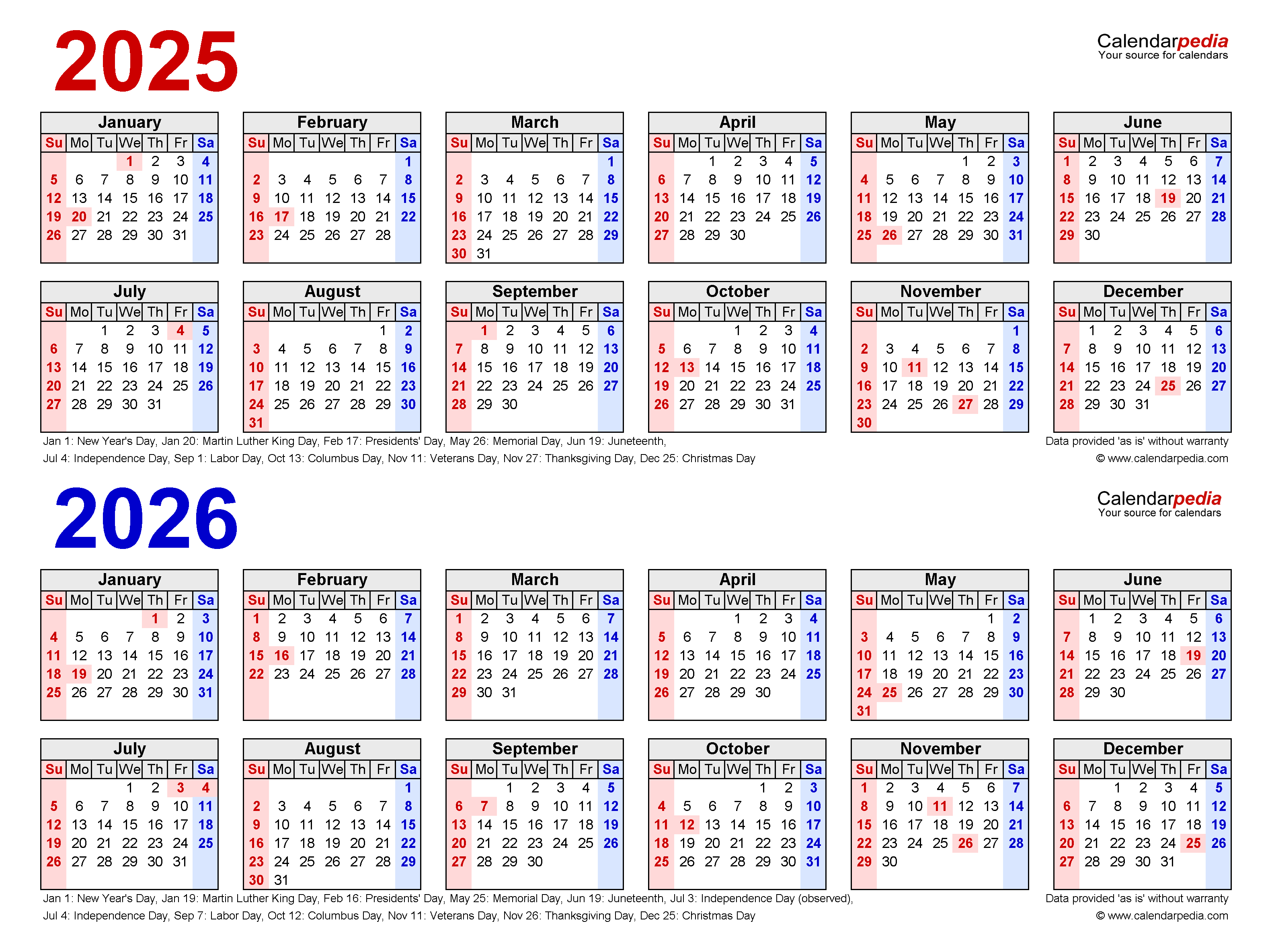
Closure
Thus, we hope this article has provided valuable insights into UK Calendar 2025-2026: An Overview of Public and Bank Holidays. We thank you for taking the time to read this article. See you in our next article!